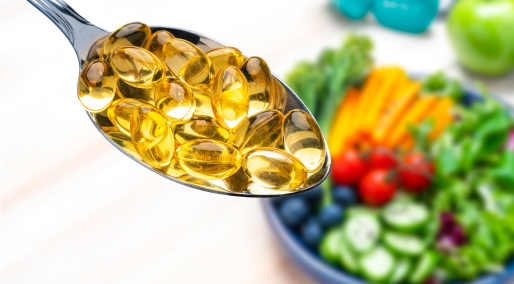.webp)
.webp)

Patryk Chodyniecki
Patryk Chodyniecki
Patryk Chodyniecki
Date Added: 03-08-2023
How to take creatine - effective creatine dosage
If you regularly engage in strength training, you have probably already heard about creatine. It is one of the most popular dietary supplements on the market, which helps increase strength and muscle mass, as well as improve training performance. However, in order to achieve desired effects, it is important to know how to take creatine and what effects it may have. Should you take it before or after a workout? What does creatine provide? If you have these questions, you will find all the answers in this article.
Contents
- What is creatine and how does it work?
- How does creatine work?
- Why use creatine?
- Types of creatine
- Creatine monohydrate
- Creatine hydrochloride
- Creatine sulphate
- Creatine malate (Tri-Creatine Malate)
- Buffered creatine (cre-alkaline)
- Phosphate creatine
- Magnesium chelate of creatine
- How do you dose creatine?
- How many grams of creatine to take?
- How do I take creatine on non-workout days?
- Should the dosage be reduced on non-workout days?
- What is the maximum length of time I can use creatine?
- Contraindications to taking creatine
- Creatine and diet
- Creatine in sport
- Creatine and sprinters
- Creatine and bodybuilding
- Creatine and interval training
- Summary
If you regularly do strength training, you have surely heard of creatine. It is one of the most popular dietary supplements on the market, helping to increase strength and muscle mass and improve training performance. However, in order to get the desired results, it is important to know how to take creatine and what effects it has. Should you take it before or after training? What does creatine do? If you are concerned about these questions, you will find all the answers in this article.
What is creatine and how does it work?
Creatine is a chemical compound that occurs naturally in the human body. It is mainly located and stored in skeletal muscles and in smaller amounts in the brain and kidneys. Creatine is synthesised from the amino acids glycine, arginine and methionine.
How does creatine work?
Once ingested, creatine is stored in the muscles in the form of creatine phosphate. It is responsible for providing energy during exercise and increasing physical performance. Above all, creatine works to increase the amount of available energy in the muscles, allowing for longer and more intense training. For these reasons, creatine supplementation is so popular among athletes.
Why use creatine?
Creatine is one of the most popular supplements in sport, enjoyed by coaches and athletes around the world. Why should you use creatine in your diet?
- The first and most important reason is to improve training performance - Creatine allows you to increase energy production in your muscles, resulting in increased strength and endurance during exercise. This allows you to perform more repetitions and achieve your goals more easily and effectively.
- Another important aspect of using creatine is to increase muscle mass - Regular intake of this supplement results in greater muscle protein synthesis, leading to increased muscle volume and an improved overall appearance.
- Creatine can also have a positive effect on muscle recovery after training, so that you can return to intense exercise more quickly. In addition, the use of creatine can help to increase your metabolism, resulting in faster fat burning and better weight loss.
In summary, creatine is a supplement worth using because of its numerous benefits for strength training. It improves training performance, increases muscle mass, has a beneficial effect on muscle regeneration, increases metabolism and helps to reduce body fat. However, it is important to remember that the optimum dosage and method of taking creatine depends on the individual body's needs and should be determined in collaboration with a trainer or nutritionist. What are the types of creatine and how can it be used safely?
Types of creatine
There are many types of creatine available on the market, the most commonly used being creatine monohydrate and creatine hydrochloride. However, below we will describe a few more forms of it that you are sure to come across in a good supplement shop:
Creatine monohydrate
Creatine monohydrate, the most popular form of creatine, is the most commonly used supplement by athletes. Monohydrate is effective and relatively cheap. When creatine monohydrate is consumed, the absorption and storage of creatine in the muscles is significantly increased, allowing you to build muscle mass and strength quickly.
Creatine hydrochloride
Creatine hydrochloride is another form of creatine that is more expensive than monohydrate. It has better solubility in water and better absorption by the body. However, it is uncertain whether creatine hydrochloride is more effective than creatine monohydrate. There are no conclusive studies on this effect.
Creatine sulphate
This form of creatine is modified to increase its bioavailability to the body. Despite the lack of conclusive scientific evidence, some users report increased strength and endurance after its use.
Creatine malate (Tri-Creatine Malate)
The combination of creatine with malic acid is designed to increase its bioavailability. This type of creatine may have the advantage of reducing the side effects associated with indigestion that sometimes accompany creatine monohydrate supplementation.
Buffered creatine (cre-alkaline)
It has the advantage of being easily absorbed. In addition, it does not cause any side effects associated with indigestion. Many people believe that it is more effective than creatine monohydrate, but there is a lack of conclusive scientific evidence in this regard.
Phosphate creatine
The advantage of this form is its ability to increase ATP production (to a greater extent than Monohydrate), which theoretically translates into greater strength and endurance. However, there is a lack of scientific support for these claims.
Magnesium chelate of creatine
Creatine combined with magnesium theoretically provides better bioavailability. Additionally, magnesium is an important mineral that contributes to proper muscle function. Keep in mind that different forms of creatine may work differently for each individual, so it is important to experiment and see what suits your needs best. Remember to always consult your doctor or nutritionist before starting supplementation.
How do you dose creatine?
If you have decided to supplement with this product, you need to know how to use creatine to get maximum results. The basic rule is to take creatine regularly - at least for a few weeks. This will give your body time to store it properly in your muscles. It is best taken in the morning and after training - on training days. On non-training days, it is recommended to take it on an empty stomach during the day.
How many grams of creatine to take?
There are different ways of dosing creatine, but through research it is known that the best amount is 3-5g per day. This ensures that there are no side effects and that the effects are noticeable.
Maintenance dose: 3-5 g per day on non-training days.
Dose to start supplementation: 3-5 g daily for one week, then 3-5 g before and after training.
Dose for cyclical supplementation: 3-5 g for 8-12 weeks, followed by a break for 4 weeks.
Remember to drink plenty of water during creatine supplementation. This will avoid digestive problems and help your body to store the creatine found in your muscles.
Maintenance dose: 3-5 g per day on non-training days.
Dose to start supplementation: 3-5 g daily for one week, then 3-5 g before and after training.
Dose for cyclical supplementation: 3-5 g for 8-12 weeks, followed by a break for 4 weeks.
Remember to drink plenty of water during creatine supplementation. This will avoid digestive problems and help your body to store the creatine found in your muscles.
How do I take creatine on non-workout days?
Taking creatine on non-workout days is just as important as its supplementation on workout days. However, it is important to note that the amount of creatine taken should be less than on training days. It is recommended to take approximately 3-5g of creatine per day on non-training days. The safe maximum amount per day is around 20g of creatine. As far as the timing of creatine intake on non-training days is concerned, this is of little importance. Creatine accumulates in the body over a long period of time, so there is no special need to take it at a specific time of day. Nevertheless, the best effects occur when it is taken on an empty stomach.
Should the dosage be reduced on non-workout days?
It is not necessary to reduce the dosage of creatine on non-workout days, as the body still needs this ingredient to replenish energy reserves and creatine concentration in the muscles.
What is the maximum length of time I can use creatine?
Creatine is a dietary supplement that athletes and trainers use to improve their performance and achieve better results. However, like any other dietary supplement - creatine should also be used in moderation and according to the recommendations of the manufacturer and nutritionist. There is no maximum period for which creatine should be taken, as this depends on the individual body's needs and level of physical activity. Usually, however, creatine is used for a period of 4 to 12 weeks, followed by a break. During the break, the body should rest from supplementation and undergo natural regeneration processes.
Contraindications to taking creatine
Despite the benefits of creatine supplementation, there are instances where it should be avoided. The most important contraindications to taking creatine are kidney disease and metabolic problems. Before starting treatment, consult your doctor and rule out the presence of these diseases. Other contraindications you need to bear in mind include people who suffer from liver disease, low blood pressure or have an intolerance to creatine ingredients. You also need to remember not to exceed the recommended doses. The use of creatine may be associated with the risk of side effects such as:
- diarrhoea,
- stomach pains,
- digestive problems,
- muscle cramps.
It is worth remembering that the side effects associated with taking creatine are rare and usually mild. However, if you experience any adverse reactions, it is worth consulting your doctor or nutritionist.
Creatine and diet
Adequate nutrition is key to achieving the best results when using creatine. During supplementation, special attention should be paid to the amount of protein and carbohydrates consumed. Proteins play an important role in the process of building muscle mass, so they should also be properly proportioned in the diet. Carbohydrates, on the other hand, provide the body with the energy it needs to carry out intensive strength training. It is worth paying attention to the type of carbohydrate and its glycaemic index. Carbohydrates with a low glycaemic index increase blood glucose levels in a gradual manner, allowing for a long-lasting feeling of satiety and avoiding a sudden drop in energy. In addition, the use of creatine can increase appetite, which can lead to fat gain. For this reason, it is important to provide the body with sufficient protein and carbohydrates, but also to control the calorie content of meals and their frequency.
Creatine in sport
Regular use of creatine can help to increase strength and endurance, which can contribute to improved sports performance. We have listed the most common sports in which it is used below.
Creatine and sprinters
For sprinters who need maximum muscular strength and endurance over a short distance, the use of creatine can be particularly beneficial. The increase in muscle mass and strength that creatine provides can help improve performance in sprints and long jump.
Creatine and bodybuilding
For bodybuilders, creatine is one of the essential supplements as it helps to increase muscle mass and improve strength. Creatine helps maximise your training time and enables you to perform better in less time.
Creatine and interval training
Creatine can also help with interval training, which involves physical exertion over short periods of time. Its use can increase muscular endurance and strength, which in practice helps to achieve better results in such workouts.
Without a doubt, creatine is a popular dietary supplement among athletes, especially those practising sports that require strength and muscle mass. Through its use, performance can be improved, but it is worth remembering that supplementation should take place according to the recommendations of a dietician or doctor and should not replace a healthy and balanced diet and regular training.
Without a doubt, creatine is a popular dietary supplement among athletes, especially those practising sports that require strength and muscle mass. Through its use, performance can be improved, but it is worth remembering that supplementation should take place according to the recommendations of a dietician or doctor and should not replace a healthy and balanced diet and regular training.
.webp)
Summary
Nowadays, more and more people are paying attention to their health and fitness. Strength training and creatine supplementation are effective ways to increase muscle strength and improve performance and endurance during workouts. However, it is worth remembering that every body is different and what works for one will not necessarily work for another. When it comes to creatine supplementation, the correct dose is key. Remember to carefully follow the manufacturer's instructions and consult your doctor or dietician if you have any doubts as to whether you belong to a group of people who have contraindications to taking it.
.png)
.png)
Bibliography:
www.bodybuilding.com - How to take creatine clearing up the confusion
ostrovit.com - Recommended dosage and possible side effects of creatine
examine.com - Creatine
Rate the text

AUTHOR
Patryk Chodyniecki
Patryk Chodyniecki
Patryk Chodyniecki
A passionate bodybuilding, swimming, and martial arts enthusiast. He has been practicing strength sports for over 10 years, alternating between boxing, MMA, and swimming, which he enjoys combining. He is also interested in the broad field of supplementation and nutrition, which he gradually implements into his training.
A passionate bodybuilding, swimming, and martial arts enthusiast. He has been practicing strength sports for over 10 years, alternating between boxing, MMA, and swimming, which he enjoys combining. He is also interested in the broad field of supplementation and nutrition, which he gradually implements into his training.
Comments (0)








.webp)

















